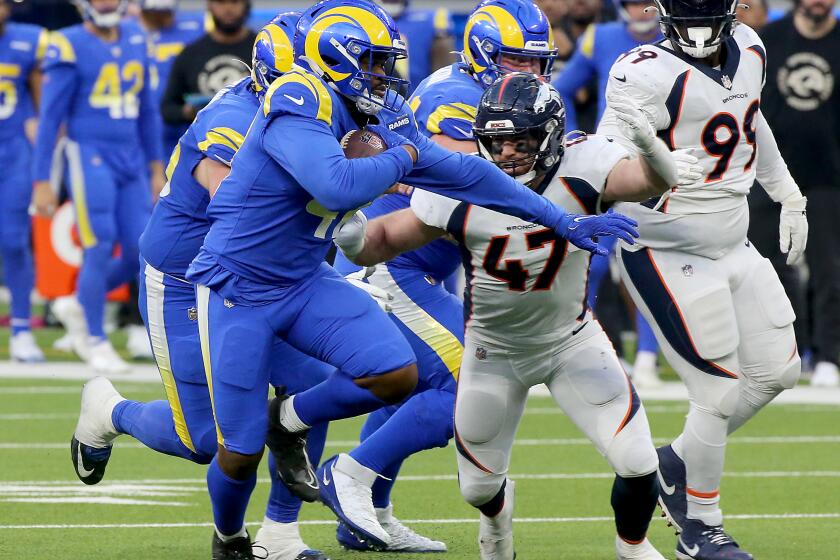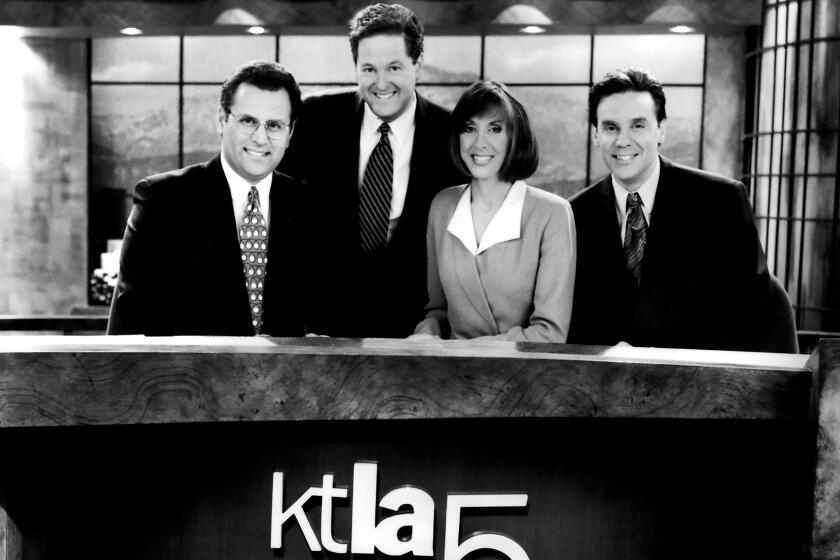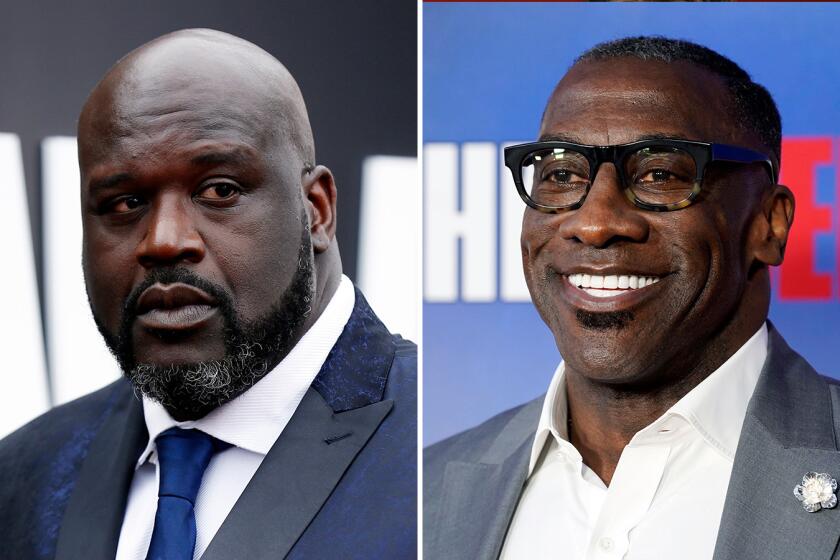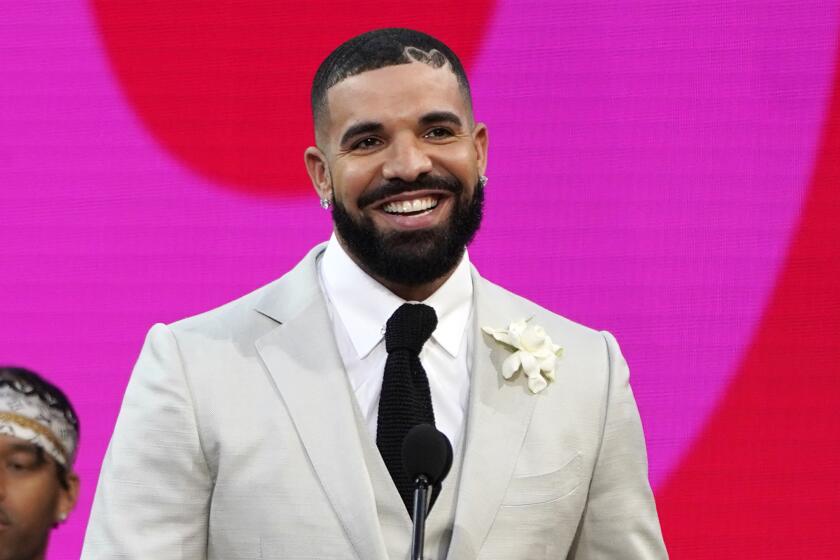Question Is: Will ABC Tune Out the NFL? : With Contract Set to Expire, a Mad Scramble Could Ensue
The $1-billion question in sports television these days is this: Will ABC ante up again for “Monday Night Football” after its contract with the NFL expires this season?
ABC has televised “Monday Night Football” since its inception in 1970. But because the prime time football package has lost a lot of money the past couple of seasons, ABC Sports executives say the network might drop the telecasts. Although that possibility still seems unlikely, a spate of suitors are courting the National Football League, hoping to lure prime time football into cable or syndication the next time around.
So even though ABC might just be playing a mind game with the NFL, trying to create an atmosphere in which lower rights fees are expected, the folks at ESPN, WTBS and HBO are trying to establish their credentials as viable carriers of pro football.
The NFL is expected to stick with its proven three-network monopoly of the airwaves. But what ABC decides on “Monday Night Football,” and what the NFL decides on the new offers will go a long way in determining the not-so-distant future of cable participation.
The NFL’s five-year, $2.1 billion contract with the networks expires after this season. ABC has the right of first refusal on the “Monday Night Football” package. ABC reportedly lost up to $40 million in 1985 on its NFL prime time football, which includes its five Thursday and Sunday telecasts. The network’s new ownership, Capital Cities ABC, has become increasingly adamant about cutting losses.
“We are continuing to lose money on ‘Monday Night Football’ this year,” said ABC Sports President Dennis Swanson, “and we don’t want to be in a business where we’re losing money. We will go to the (negotiating) sessions with an open mind. The problem is, it hasn’t been a good business for us.
“We recognize the value, in terms of programming, of ‘Monday Night Football’ to the entire network. . . .Sure, we want to retain the property. Yes, it does well in the ratings. But we’re not the government. We can’t operate losing money every year.”
Like the other networks, ABC Sports’ recent problems have stemmed from a deflated advertising market. Despite the fact that “Monday Night Football” has enjoyed ratings success in 1985 and 1986--one of the network’s few prime time shows to consistently win its time period--the annual $150 million or so ABC paid in rights fees has exceeded its ad revenue.
When the NFL negotiates its next TV pact, industry analysts are figuring that it again will cost between $150 million and $200 million annually for a prime time package, perhaps totaling $1 billion for a five-year deal (although a three-year contract may be more likely next time). Those numbers, naturally, worry some at ABC. And there are those at the network who believe the prime time package is overrated, anyway.
“Sixteen or 18 weeks a year, ‘Monday Night Football’ does wonderfully for us. But that’s only 16 Mondays a year,” said an ABC Entertainment executive who asked not to be named. “Two-thirds of the year we don’t have ‘Monday Night Football’ in that time slot, and we haven’t done particularly well at those times. Plus, the (Thursday and Sunday) games have not fared as well. What I might be asking is: Would we be better off with other programming at 9 o’clock Mondays that we can generate an audience for year-round?”
Still, most television people expect ABC to retain its “Monday Night” institution.
“It’s highly unlikely they would pass on the package unless the economics became outrageous,” said Steve Grubbs, head of sports advertising at BBDO agency in New York. “They will do everything they can to keep the package. It pulls down a good prime time number and, after all, ABC is still in third place.”
If ABC passes on Monday nights--”It’s not a course of action we want to take,” Swanson said--it could set up the maddest money-mongering scramble in TV sports history.
Neither NBC (with the No. 1 prime time schedule) nor CBS (with a strong tradition of not programming sports in prime time) has expressed an interest in “Monday Night Football.” (When the NFL first shopped around the “Monday Night” idea 17 years ago, all of the networks passed on it. ABC sort of backed into the package because it looked as if it was going to go into syndication, and most of the stations wanting it were ABC affiliates. ABC then decided to take it.)
On the premise that ABC might pass or the NFL might be looking to expand its television universe, several contenders have moved into the picture:
--ESPN, which is asking multiple-system cable operators to increase the per-subscriber fee they pay the cable sports network by 25 cents to 50 cents each month to allow it to bid for an NFL package. ESPN says 60 of the top 100 cable operators have pledged financial support.
--WTBS, which has contacted the top 30 cable operators, asking them to consider a joint venture (sharing costs and profits) to obtain NFL rights.
--USA, a basic-cable network that once carried major league baseball and NHL games, also sent a letter to cable operators with proposals similar to those of ESPN and WTBS.
--HBO, which as a premium pay service (unlike ESPN and USA), also is interested in an NFL package, probably prime time games other than Mondays. “We are not chasing ‘Monday Night Football,’ ” said Seth Abraham, an HBO senior vice president. “It’s not realistic (financially). But we’ve got the pole position (for other prime time games).”
In addition, LBS Communications, a New York-based syndicator, and Rupert Murdoch’s fledgling Fox Broadcasting Network have expressed interest. LBS met with a group of advertisers this month to determine its chances of syndicating a prime time package. Meanwhile, a group of major cable operators, headed by James Cownie, executive vice president of Heritage Communications, has decided to make an independent effort to concentrate on getting Sunday night games.
“There are two virgin pieces of property for cable: the NFL and the Olympics,” Abraham said. “Potentially, there could be a fourth network right now if the NFL could be had. We’d love the NFL. I think the NFL will go to a fourth carrier in this upcoming contract.”
Although some cable interests definitely are leaning toward bidding for prime time games other than “Monday Night Football,” ESPN President Bill Grimes clearly would love to make the big catch.
“We’re now strong enough financially that we can take some risks we couldn’t take a few years ago,” he said. “All we have to do is get more money from the cable operators. . . .Maybe $150 million would bring us ‘Monday Night Football’ exclusively. The price of playing poker can quickly be anted up by a united cable industry. Twelve hundred and fifty cable operators are knocking on doors for sales. What would the impact of 18 NFL games be?”
Each of the new players in the NFL TV game--basic cable, HBO and the independents syndicators--is trying to make compelling arguments to the league about its viability.
Basic cable’s biggest drawbacks are that it penetrates fewer than 50 percent of the nation’s TV homes and it would be competing with the networks for the same advertising dollars. “Still, ESPN or TBS will fight for ‘Monday Night Football.’ They’d love to have a piece of it,” said BBDO’s Grubbs. “It puts them up a notch with the viewer and the advertiser. It makes them almost a network, giving them stature they couldn’t get otherwise.”
HBO believes it substantially can increase its subscriber base with the NFL. Still, HBO has a relatively limited reach (about 14.6 million homes, compared to 38.5 million for ESPN and 37.7 million for WTBS). But many industry observers like HBO’s chances with the NFL because it is commercial-free and wouldn’t be competing for advertising money, thus making it no threat to network revenues.
A syndicator such as LBS or independent network such as Fox would be attractive because, unlike cable, either one can penetrate most of the U.S. television market.
“What if ABC declined to bid on the ‘Monday Night Football’ package?” asked Neal Pilson, a CBS Broadcast Group executive overseeing sports. “Then I think the alternative to the league would be some form of syndicated TV arrangement-a syndicator or a group of independents trying to replace ABC.”
The NFL, which isn’t talking right now, has announced it will begin serious TV negotiating shortly after the new year. Until then, each of the prospective buyers has contacted the league informally to let it know of its interest.
No matter how the negotiations fall, it seems virtually a certainty that “Monday Night Football” will be around in 1987 for an 18th season. And, in all likelihood, the big event will remain off cable for now-and on ABC.
“I’d be very surprised if ABC didn’t end up with it again,” said ABC sportscaster Al Michaels, who does play-by-play on the games. “I’d be shocked if it doesn’t go to one of the networks. ‘Monday Night Football’ should be on (the networks). I think the NFL knows that. It won’t go to the outside.”
More to Read
The biggest entertainment stories
Get our big stories about Hollywood, film, television, music, arts, culture and more right in your inbox as soon as they publish.
You may occasionally receive promotional content from the Los Angeles Times.






